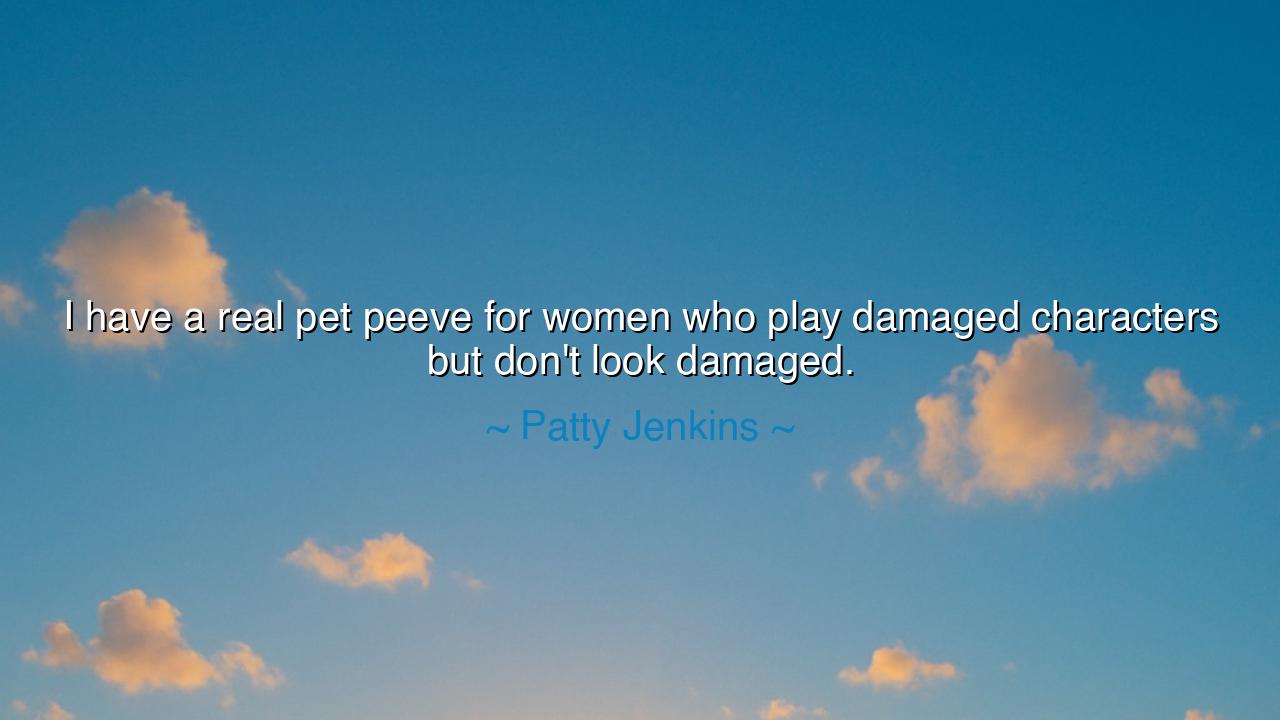
I have a real pet peeve for women who play damaged characters






The filmmaker Patty Jenkins, whose vision brought heroes and mortals alike to the screen, once spoke with candor: “I have a real pet peeve for women who play damaged characters but don’t look damaged.” Though spoken of cinema, these words reach far beyond the world of actors and scripts. They are about truth, authenticity, and the responsibility of storytellers to honor the weight of suffering with honesty rather than artifice. For in every age, there has been the temptation to present the broken as beautiful, to polish tragedy into spectacle, to strip pain of its rawness. Jenkins calls us back to reverence: that to embody the damaged character is to show damage, not disguise it.
The meaning of her words is clear: suffering leaves marks. Grief etches itself into the lines of the face. Trauma reshapes the body and the eyes. A character who has been broken by life cannot appear untouched, for to do so is falsehood, and falsehood dishonors both the role and the reality of those who have endured such struggles in truth. Jenkins speaks against this illusion, for it diminishes the lived pain of countless women and men whose scars, visible or invisible, bear witness to their journey.
History offers us examples where art chose honesty and revealed power. Consider the ancient Greek tragedies, where characters like Antigone or Medea were not portrayed as flawless beauties untouched by suffering, but as figures scarred by grief, rage, and defiance. The dramatists knew that audiences must see the anguish if they are to feel it. To cleanse the characters of their pain, to present them only as pleasing, would have been a betrayal of truth. In this way, Jenkins stands in the same tradition as those ancient poets, demanding that art reflect the weight of human struggle, not a hollow mask.
Her words also recall the story of Charlize Theron in Monster, a role Jenkins herself directed. Theron, a figure of great beauty, transformed her body, her face, her entire presence, to honor the reality of Aileen Wuornos, the woman she portrayed. Jenkins demanded no glamour, no concealment, but raw authenticity. The performance was haunting not because Theron was beautiful playing at ugliness, but because she shed her beauty to reveal the wounds of a real, broken soul. That is the essence of Jenkins’ teaching: that truth requires sacrifice, and art must humble itself before reality.
The origin of this frustration lies in the long tradition of women’s roles in film being flattened, sanitized, or made palatable for consumption. For centuries, stories have adorned female suffering in beauty, turning tragedy into spectacle. Jenkins, by contrast, insists that to tell the story of the broken is to show the broken as they are. Anything less is not storytelling but deception, a betrayal of those whose voices are rarely heard.
The lesson for us all is profound: when we tell stories—whether through art, through words, or through our lives—we must honor truth over appearances. Do not cover pain with false beauty, do not polish sorrow into spectacle. Show scars. Speak honestly of wounds. For in honesty lies the power to connect, to heal, and to remind others that they are not alone in their brokenness. The polished mask inspires no one; the scarred truth inspires all.
Practical action flows naturally. When you watch stories, look for authenticity, and support those who honor it. When you tell your own story, resist the urge to mask your struggles in perfection. Show your pain, share your scars, speak with honesty. In doing so, you not only claim your truth but also give courage to others. Let us demand of our storytellers, as Jenkins does, that suffering be portrayed with dignity, not with deceit.
Thus her words endure: “I have a real pet peeve for women who play damaged characters but don’t look damaged.” Let them be remembered not as criticism alone, but as a call to truth. For only when art dares to show the real can it heal. Only when we embrace scars can we honor the strength it takes to carry them. And only when we refuse false beauty in place of truth will future generations see themselves reflected honestly in the stories of the world.






AAdministratorAdministrator
Welcome, honored guests. Please leave a comment, we will respond soon